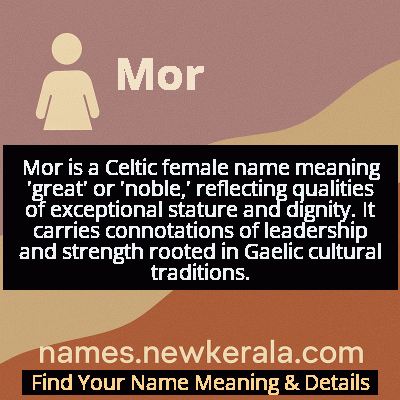Mor Name Meaning & Details
Origin, Popularity, Numerology Analysis & Name Meaning of Mor
Discover the origin, meaning, and cultural significance of the name MOR. Delve into its historical roots and explore the lasting impact it has had on communities and traditions.
Name
Mor
Gender
Female
Origin
Celtic
Lucky Number
1
Meaning of the Name - Mor
Mor is a Celtic female name meaning 'great' or 'noble,' reflecting qualities of exceptional stature and dignity. It carries connotations of leadership and strength rooted in Gaelic cultural traditions.
Mor - Complete Numerology Analysis
Your Numerology Number
Based on Pythagorean Numerology System
Ruling Planet
Sun
Positive Nature
Leaders, ambitious, highly driven, self-reliant, innovative.
Negative Traits
Overly aggressive, domineering, impatient, selfish.
Lucky Colours
Red, orange, gold.
Lucky Days
Sunday.
Lucky Stones
Ruby, garnet.
Harmony Numbers
2, 3, 9.
Best Suited Professions
Entrepreneurs, managers, engineers.
What People Like About You
Courage, determination, leadership.
Famous People Named Mor
Mor O'Hagan
Irish noblewoman
Powerful Gaelic noblewoman who played significant political roles in Ulster during the Tudor conquest of Ireland
Mor Mac Bruaideadha
Irish poet and historian
Member of the famous Mac Bruaideadha literary family who preserved Gaelic traditions and historical records
Mor Fraser
Scottish clan leader
Influential figure in the Fraser clan known for her leadership during turbulent periods in Scottish history
Mor ni Tuathail
Irish noblewoman
Mother of the legendary Irish king Diarmait Mac Murchada and influential political figure in her own right
Name Variations & International Equivalents
Click on blue names to explore their detailed meanings. Gray names with will be available soon.
Cultural & Historical Significance
Throughout the Gaelic world, Mor represented more than just a personal identifier—it symbolized the bearer's connection to ancestral lines and their expected role in preserving cultural traditions. The name's persistence through centuries of Celtic history demonstrates its enduring cultural importance and the valued qualities it represents in Gaelic-speaking communities. In modern Celtic revival movements, the name has taken on additional significance as a symbol of cultural pride and the reclamation of Gaelic identity, particularly among diaspora communities seeking to maintain connections with their heritage.
Extended Personality Analysis
Women named Mor are typically perceived as possessing strong leadership qualities, natural authority, and a dignified presence that commands respect. They often exhibit remarkable resilience and inner strength, capable of navigating challenging circumstances with grace and determination. Their 'greatness' extends beyond mere stature to encompass intellectual depth, emotional intelligence, and a profound sense of responsibility toward their communities. Mor's tend to be strategic thinkers with excellent judgment, often serving as pillars of stability in their families and social circles.
These individuals combine traditional wisdom with progressive thinking, making them effective mediators and advisors. While they may appear reserved initially, they possess deep loyalty and fierce protectiveness toward those they care about. Their strength is balanced by compassion, and their leadership style typically emphasizes collaboration and mutual respect rather than authoritarianism. Mor's often become the keepers of family histories and cultural traditions, valuing heritage while embracing positive change. They typically demonstrate a strong connection to their roots and a commitment to preserving what matters most, whether in their personal relationships or broader community involvement.
Modern Usage & Popularity
In contemporary times, Mor has experienced a revival among families seeking to reconnect with their Celtic heritage, particularly in Ireland, Scotland, and among diaspora communities. While not among the most popular names statistically, it holds significant appeal for parents valuing traditional names with strong cultural roots and meaningful connotations. The name's simplicity and power make it attractive in an era where many seek names that are both distinctive and meaningful. Modern usage often sees Mor paired with more contemporary middle names, creating a balance between tradition and modernity. Its usage has expanded beyond purely Celtic communities as global interest in Gaelic names grows, though it remains most common in regions with strong Celtic cultural connections. The name's rarity in mainstream contexts adds to its appeal for parents seeking unique yet historically grounded names for their daughters, and it continues to represent a connection to Celtic identity in an increasingly globalized world.
Symbolic & Spiritual Meanings
Symbolically, Mor represents the concept of 'greatness' in its most profound sense—not merely physical stature but moral and spiritual elevation. It embodies the Celtic ideal of sovereignty, where true leadership arises from wisdom, justice, and connection to one's people and land. The name carries connotations of mountains and enduring strength, suggesting stability and permanence amid change. In Celtic symbolism, it connects to the ancient reverence for maternal figures who served as guardians of tradition and community wellbeing. Mor also symbolizes the bridge between past and future, representing the continuity of cultural identity through generations. The name evokes images of standing stones and ancient wisdom, suggesting a person grounded in tradition yet capable of visionary thinking. It represents the Celtic understanding that true greatness involves service, protection, and the nurturing of community rather than mere personal achievement or power, making it a name rich with cultural and spiritual significance.

